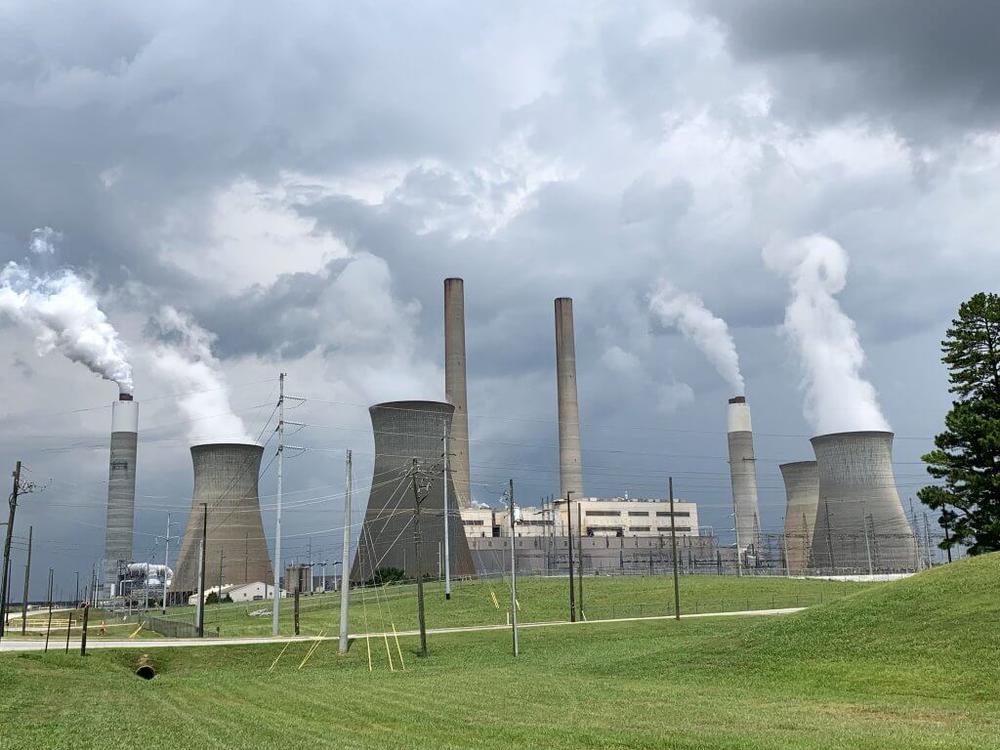
Caption
Plant Bowen near Cartersville is one of a few coal-fired plants Georgia Power still operates in the state. It’s now poised to be the last to shut down.
Credit: Georgia Recorder/file photo

Plant Bowen near Cartersville is one of a few coal-fired plants Georgia Power still operates in the state. It’s now poised to be the last to shut down.
Georgia Power plans to power down the last of its coal-fired plants by 2035, when Plant Bowen in northwest Georgia is poised to close, according to long-term planning documents the company filed Monday.
The documents filed Monday present the utility’s long-term plans to produce energy, which the Georgia Public Service Commission must sign off on. Monday’s filing kicks off a process that happens every three years and will be closely watched as utilities face pressure to decarbonize. A commission vote is expected by the summer.
The utility’s plans call for shuttering a total of 12 coal units by 2028 – representing a loss of 3,500 megawatts, which the utility plans to offset with 2,356 megawatts in natural gas. Bowen would then close by 2035.
Georgia Power also announced Monday it plans to increase its renewable capacity, proposing to add 2,300 megawatts in the near term.
“At Georgia Power, we know that to continue to meet the changing needs of our customers we must prepare now to build the electric system and energy infrastructure of the future,” Chris Womack, chairman, president and CEO of Georgia Power, said in a statement. “We believe this (plan) outlines how we will do that and how, working with the Georgia Public Service Commission, we will build upon the solid foundation we already have as the energy landscape continues to evolve.”
The utility’s parent company, Southern Co., had already signaled late last year that it intended to retire about 55% of its coal fleet over the next decade as the company works toward its goal to reach net zero emissions by 2050.
In Georgia, the next coal plant teed up for retirement is Plant Wansley in west Georgia this year.
The public airing of the utility’s plans will draw environmentalists, consumer advocates and others. The Georgia Chapter of the Sierra Club offered a glimpse of the arguments to come Monday, with the group criticizing the utility’s plans to bring on more natural gas.
“It’s time for Georgia Power to stop clinging to fossil fuel plants that pollute our air and water, needlessly increase costs for customers, and directly damage our climate,” Charline Whyte, a spokesperson for the Sierra Club’s Beyond Coal Campaign in Georgia, said in a statement.
“Coal plant retirements are still too far off, and Georgia Power wants to procure a massive amount of fracked gas. Transitioning to clean energy would save customers money immediately, invest in our local economy, and provide good jobs here in Georgia.”
The long-term planning process is also likely to stoke the public debate on how Georgia Power should dispose of coal ash waste. In 2019, the commission allowed the utility to pass along $525 million in coal ash cleanup costs to consumers.
Georgia Power is seeking permits to install a cover over coal ash ponds at five plants, leaving the toxic waste where it sits in unlined pits and submerged at varying depths in the groundwater.
The utility revealed Monday it may now dig up the coal ash at Wansley, as it plans to do at other sites like Plant Branch in Milledgeville. But that would still leave massive piles of toxic waste in the groundwater at four sites.
The U.S. Environmental Protection Agency announced plans in January to crack down on dangerous coal ash waste sites, including the enforcement of an Obama-era rule designed to limit the chances of coal ash toxins leaking into groundwater or waterways. Georgia is one of a few states that have created a state-level permitting program.
The federal agency says its position has always been that coal ash should not be in contact with groundwater, but the state’s top environmental regulator and Georgia Power have called it a shift.
“The EPA has recently announced its new positions on the nearly seven-year-old rule,” Georgia Power said in an environmental compliance document filed Monday. “And the Company remains focused on compliance and will continue to work with the Georgia EPD to ensure safe and effective closure (of) ash ponds.”
The cap-in-place work is already completed at some sites, such as Plant Hammond in Rome, even though state regulators have not approved the permits. At Hammond, a permit has been proposed but not completed. Georgia Power has already made “significant progress” with its closure plans, the utility reported Monday.
As Georgia Power phases out more coal-fired plants, the company’s plan says its nuclear expansion of Plant Vogtle should be up and running later this year and in the second quarter of 2023. That project is billions of dollars over budget and years behind schedule.
This story comes to GPB through a reporting partnership with Georgia Recorder.